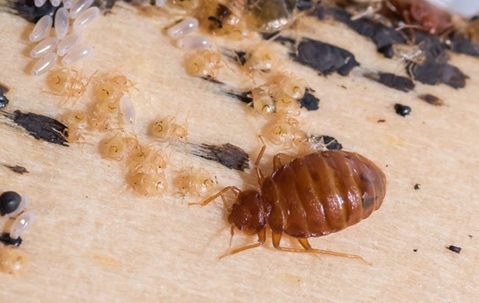Bed Bug Exterminator Houston Treatment: Specialized Methods for Obliteration
Bed Bug Exterminator Houston Treatment: Specialized Methods for Obliteration
Blog Article
Advanced Bug Control Techniques for a Pest-Free Living Room
While standard parasite control techniques have their area, the advancement of innovative strategies uses a look right into a future where pest-free rooms are not simply a dream however a truth. From Integrated Pest Administration strategies to cutting-edge High-Tech Parasite Checking Solutions, a new era of insect control is arising.
Integrated Parasite Management (IPM)
Integrated Bug Administration (IPM) is a methodical strategy that focuses on utilizing different methods to control pests successfully while decreasing ecological effect and economic prices. This approach incorporates numerous parasite control methods such as organic control, habitat manipulation, modification of cultural practices, and using immune plant selections. By incorporating these strategies, IPM aims to take care of insects in a sustainable and eco responsible way.
One key aspect of IPM is the emphasis on prevention as the first line of protection versus insects. This involves surveillance parasite populations, determining potential threats, and carrying out positive steps to lower insect invasions prior to they end up being bothersome. By utilizing preventative procedures, IPM can significantly decrease the demand for chemical pesticides, thereby mitigating potential damage to non-target microorganisms and the bordering ecosystem.
In addition, IPM promotes the usage of pesticides only as a last option and in a targeted manner. This targeted technique minimizes chemical use, lowers the danger of pesticide resistance in parasite populaces, and assists keep a much healthier atmosphere for both human beings and wild animals. On The Whole, Integrated Bug Management stands as a thorough and lasting option for efficient parasite control while prioritizing environmental conservation and financial efficiency.
All-natural Repellents and Deterrents
Using natural repellents and deterrents is a lasting and environmentally friendly approach to managing parasite populaces in numerous atmospheres. Natural repellents function by leveraging aromas or compounds that parasites locate unpleasant or overwhelming, driving them away from the location. Pepper mint oil is effective in hindering crawlers, while citrus peels can ward off ants. Planting marigolds around a garden can aid keep away bugs like aphids and insects as a result of their solid scent - bed bug exterminator houston near me. Furthermore, crucial oils such as lavender, eucalyptus, or tea tree oil can act as natural bug sprays when diluted and sprayed around your house.
Physical deterrents also play a substantial role in insect control. By including natural repellents and physical deterrents right into pest administration techniques, people can create a pest-free living area while lessening the ecological impact.
Targeted Parasite Exemption Strategies
When implementing reliable bug control methods, targeted insect exemption strategies are crucial for preventing particular pests from accessing or infesting an assigned location. These techniques include identifying the susceptabilities that pests might exploit to get entrance and applying measures to block their gain access to points (bed bug exterminator houston near me). By focusing on targeted parasite exclusion techniques, house owners can develop a durable protection against undesirable intruders, advertising a pest-free living space.
Biological Control Approaches

One typical biological control technique is the introduction of killer pests like ladybugs or parasitical wasps that prey on particular parasites, maintaining their populaces in check. These predators work as an all-natural type of insect control without the need for chemical interventions. Furthermore, microbial pesticides why not check here stemmed from normally taking place bacteria, fungis, or viruses can contaminate and eliminate insects while posing very little danger to people and beneficial pests.
Applying organic control techniques calls for an extensive understanding of the community and the parasites present to present the most efficient natural opponents. By incorporating organic control into bug management methods, home owners can attain a pest-free living area while promoting environmental balance and minimizing dependence on chemical pesticides.
High-Tech Insect Monitoring Systems
Innovative digital devices play a critical role in modern-day parasite control by giving specific and real-time information via state-of-the-art pest surveillance systems. These systems make use of innovative innovation to spot and track parasite task, making it possible for early intervention and targeted treatments. Modern pest tracking systems frequently include sensors, electronic cameras, and automated information analysis Click This Link tools that use exceptional understandings right into insect behavior and patterns.

Additionally, high-tech bug tracking systems are designed to be easy to use, with intuitive interfaces that assist in easy interpretation of data. By leveraging these ingenious devices, pest control specialists can execute much more reliable and sustainable methods, inevitably developing pest-free environments for domestic and business spaces alike.
Conclusion
Finally, applying sophisticated insect control methods such as Integrated Insect Monitoring, natural repellents and deterrents, targeted bug exclusion strategies, biological control techniques, and sophisticated pest tracking systems can efficiently develop a pest-free space. By making use of a combination of these approaches, individuals can stop and Get More Info manage parasite problems in a sustainable and environmentally pleasant way. It is crucial to prioritize insect control steps to guarantee a healthy and comfortable living atmosphere.
Report this page